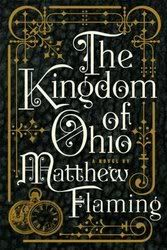 Title : The Kingdom of Ohio
Title : The Kingdom of Ohio
Author : Matthew Flaming
Genre : Sci-fi/historical fiction/steampunk
Publisher : Amy Einhorn Books (G.P.Putnam’s Sons)
Pages : 322
Rating : 3.5/5
Source : Publisher ARC
This book piqued my interest because it purported to be a time travel story, mixed together with all sorts of steampunk. And let me tell you, that time travel story it is, although not as full-blown as I would have liked. This is Matthew Flaming’s debut novel, and he coming from a philosophical background writes as such. Thus the book is what I would call “dreamily” told, by an antique shop owner much past his prime, we gather, but yet unable to forget the past.
There are two stories intertwining here, one of the antique shop owner, who tells us has that he has opened the shop, to hide away from the world. One day when he sees a photograph of a man and a woman in a book, he reminisces about the past. The second story is of a young man Peter Force, who in the early 1900s comes to New York from up North. For a living he gets a job working on New York’s great underground railway, and one day, meets Cheri-Ann Toledo, a mathematical prodigy. Toledo, she says, is from the past, having arrived seven years ahead of her time, via a malfunctioning time machine.
“I have a tale,” she says, “that defies common sense and perhaps even belief. In fact I considered inventing some other story to explain the favor I will ask.”
It takes Peter some time to untangle this statement. He nods and she closes her eyes, swaying slightly in her seat.
“But listen,” she continues, “and I will tell you the truth as simply as I can”.
At first, Force is wont to disregard Toledo’s story as so much tale. But when the great inventors and entrepreneurs of that time, Nikola Tesla, Thomas Edison and J.P. Morgan begin to wheel and deal for dibs on information on that time machine, he has no choice but to believe her truth.
Flaming builds his story painstakingly; much of the book is footnoted. There is lots of detail and lots of philosophical musing. Flaming builds up the locales well; the book has a feel of being set in steampunk-land. The novel’s narrator grapples with a wealth of information wondering what to tell us and what to leave out. Peter and Cherie-Ann’s characters are a little stark; Peter’s is built up relatively better, and I had a hard time picturing Cherie-Ann in my mind’s eye. [And I tell you this because with the best reads, the descriptions are so fantastic that the story is like a second skin, and I have a hard time remembering whether I read the book or saw the film (if there was a film)]. We hear Peter and Cherie-Ann’s story in the third person, and while we get to hear their thoughts, the language seems “heavy”, and the words seem bigger than they are. Their romance is sparingly built up and it is hard to tell that this is the great passion which will spur this novel further.
“The Kingdom of Ohio” is an interesting novel, based upon nascent technology and prodigies and love. It also uniquely brings in Tesla and Edison, and their adversarial status as they war on AC and DC current distribution methods. And while it was hard to put down, it did not quite build up to the promised climax. The pace of the story is slow, burdened with copious footnotes, and little “action”.
And while I’m not quivering with excitement at the thought of recommending this book to other readers, it is hard not to, because it was an un-put-down-able read while it lasted, and I know that it will appeal to some, whose patience and love of history is greater than mine.

